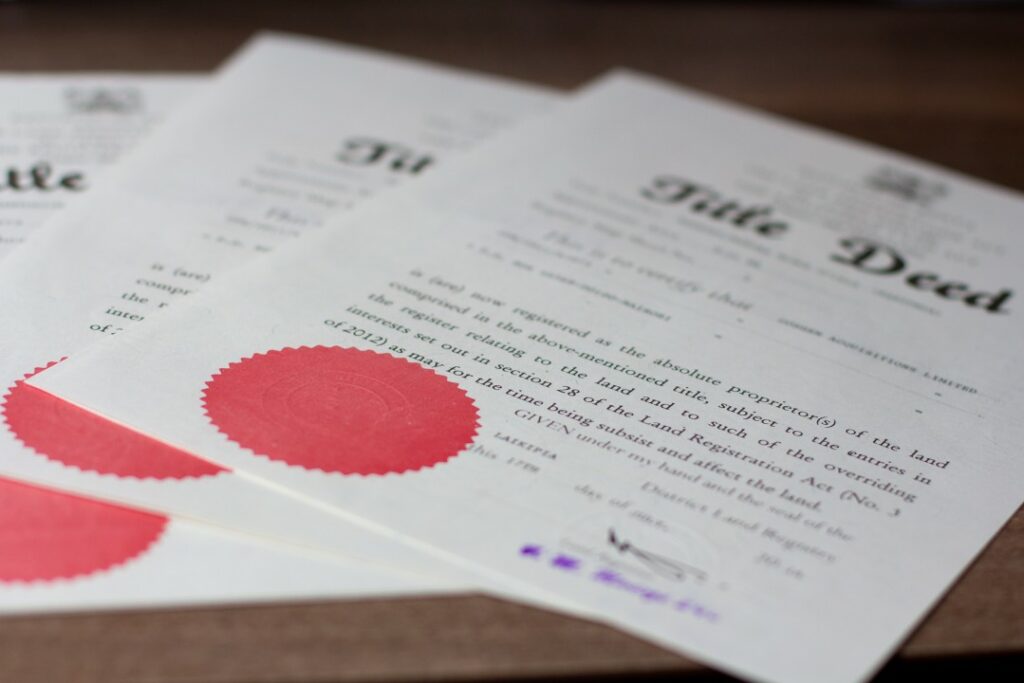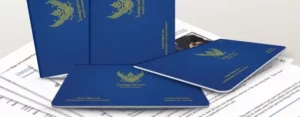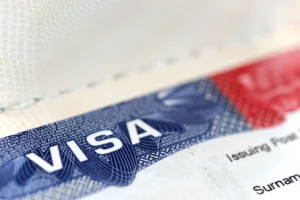Title deeds in Thailand are formal instruments issued by the Department of Lands under the Ministry of Interior, representing either ownership or possessory rights to immovable property. Unlike jurisdictions with a Torrens or common-law deed system, Thailand employs a state-controlled, cadastral system, where the title’s legitimacy and rank depend on survey standards, administrative issuance, and statutory authority.
Not all documents referred to as “title deeds” confer full ownership rights. The distinction between ownership, possession, and usage rights is central to understanding Thailand’s land tenure system.
II. Hierarchy and Classification of Title Deeds
Thai title documents fall into a graded hierarchy, with differences in legal strength, transferability, and registration.
1. Chanote (Nor Sor 4 Jor – น.ส.4 จ)
-
Full land ownership: Highest form of title under Thai law
-
Issued with precise GPS coordinates and benchmark survey points
-
Capable of:
-
Sale and transfer
-
Leasing (up to 30 years)
-
Mortgage registration
-
Subdivision and inheritance
-
The Chanote title is enforceable in all courts and conclusive evidence of ownership, unless obtained through fraud.
2. Nor Sor 3 Gor (น.ส.3 ก.)
-
Confers confirmed possessory right, not absolute ownership
-
Boundaries surveyed with aerial photography and plot map coordinates
-
Transferable and mortgageable
-
Upgradeable to Chanote under land adjudication
Registered in the land registry but subject to public notification (30 days) before transfer.
3. Nor Sor 3 (น.ส.3)
-
A lower form of possessory right
-
Boundaries defined by descriptive survey only, no physical demarcation
-
Transferable with public posting, but more vulnerable to boundary disputes
-
Not always accepted by banks for mortgage
Increasingly rare in urban areas but still common in rural provinces.
4. Sor Kor 1 (ส.ค.1)
-
Basic land occupation notification document
-
No survey, no public record of boundaries
-
Not transferable by sale; only via inheritance or adjudication upgrade
-
Not accepted for leasing or mortgaging
Effectively a preliminary document awaiting administrative land reform.
5. Sor Por Kor 4-01 (ส.ป.ก. 4-01)
-
Issued under the Land Reform for Agriculture Act B.E. 2518
-
Restricted to agricultural use by qualified farmers
-
Non-transferable except by inheritance to agricultural heirs
-
Leasing, selling, or using for non-agricultural purposes is unlawful
Although colloquially referred to as “title,” it is not a deed in the ownership sense.
III. Legal Features and Rights Conferred
| Document | Ownership | Transferable | Mortgageable | Can Build | Survey Grade |
|---|---|---|---|---|---|
| Chanote | Yes | Yes | Yes | Yes | High (GPS) |
| Nor Sor 3 Gor | No | Yes | Yes | Yes | Medium |
| Nor Sor 3 | No | Yes (after notice) | Rarely | Yes | Low |
| Sor Kor 1 | No | No | No | Case-by-case | None |
| Sor Por Kor 4-01 | No (state-owned) | No | No | Limited | Designated plots |
Only Chanote and Nor Sor 3 Gor titles are generally recommended for commercial development and long-term leasing arrangements.
IV. Issuing Authority and Land Registration
The Department of Lands (DoL) maintains the centralized registry of land rights. Procedures include:
-
Title adjudication under the Land Code B.E. 2497
-
Survey conducted by Land Office surveyors
-
Title deed printed and stamped by the local Land Office registrar
-
All transactions (transfers, mortgages, leases) must be registered and endorsed on the back of the deed
Failure to register a transfer renders it unenforceable beyond three years under Section 538 of the Civil and Commercial Code.
V. Land Measurement and Survey Protocol
A. Survey Techniques
-
Chanote: Uses precise geodetic benchmarks, satellite mapping, and GPS
-
Nor Sor 3 Gor: Uses aerial photography overlay with physical demarcation
-
Nor Sor 3 / Sor Kor 1: No physical survey; only descriptive mapping
The reliability of the title is directly correlated to its survey grade. Boundary disputes most frequently arise with Nor Sor 3 titles, especially where overlapping claims exist.
B. Chor 2, Chor 3 Maps
-
Internal land parcel maps used by the Land Office to determine parcel location and overlaps
-
Useful for identifying:
-
Encroachments
-
Overlapping titles
-
Reserved land or state forest intrusions
-
VI. Title Upgrading and Dispute Resolution
A. Title Upgrade Procedures
-
Nor Sor 3 → Nor Sor 3 Gor: By request and site survey
-
Nor Sor 3 Gor → Chanote: Requires full GPS resurvey and Land Office approval
-
Sor Kor 1 → Nor Sor 3: Through land adjudication programs
Approval depends on zoning, land use, and provincial land administration policy.
B. Title Disputes
Common issues include:
-
Duplicate issuance of title deeds
-
Encroachment into national park or forest reserve
-
Fraudulent title upgrades based on false documents
-
Improper subdivision
Legal remedies include:
-
Administrative complaint to the Department of Lands
-
Judicial cancellation of unlawful titles (under Section 61 of the Land Code)
-
Civil lawsuit for declaratory judgment under Section 1336 of the Civil and Commercial Code
-
Revocation of title by Ministerial Order in cases of proven fraud
The Supreme Court has upheld revocation of Chanote titles in numerous cases involving state land encroachment.
VII. Foreign Ownership Considerations
Foreign nationals may not own land directly in Thailand (with exceptions under Section 86 of the Land Code). Therefore:
-
A foreigner may lease land for up to 30 years (with possible renewal)
-
May acquire buildings separately via superficies (Section 1410 CCC)
-
May own condominium units under the Condominium Act B.E. 2522, within foreign quota
Use of nominee structures is prohibited under Sections 96 and 113 of the Land Code, and violators may face criminal penalties and land forfeiture.
VIII. Due Diligence Prior to Acquisition
Before acquiring land or leasehold interest, legal professionals should ensure:
-
Verification of title type and history (via Land Office extract and Chor 2 maps)
-
Confirmation of absence of encumbrances (mortgage, usufruct, litigation lien)
-
Compliance with zoning laws (construction, land use, agricultural restrictions)
-
Inspection of boundaries and survey posts
Thai law does not require sellers to disclose latent defects. Thus, pre-purchase investigation is critical.
IX. Conclusion
Title deeds in Thailand are not equal in legal value or security. The form, method of issuance, and administrative history of a title dictate the scope of rights, transferability, and risk of dispute. Only Chanote and Nor Sor 3 Gor titles should be considered for secure long-term transactions, while other types carry varying levels of legal uncertainty.
For lawyers and real estate professionals, proper due diligence and understanding of the distinction between ownership and possession is essential. Legal counsel must evaluate the survey grade, title upgrade path, and transactional limitations, particularly when acting for foreign clients or in high-value development projects.




